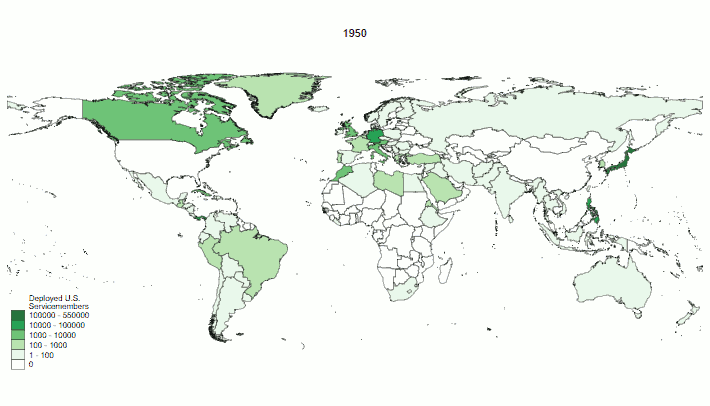My research focuses on the interaction between powerful and weak actors in international relations. This page provides some of my recent work on topics of asymmetric conflict, US foreign policy, and international political economy. For a fuller list of published and ongoing manuscripts, see the latest version of my curriculum vitae or my Google Scholar citations page.

The Effects of US Foreign Policy
- Allen, Michael A., Thomas Campbell, Nicolas Hernandez, and Valeryn Shepherd. 2023. “US Military Deployments and the Risk of Coup d’État.” Foreign Policy Analysis. DOI: https://doi.org/10.1093/fpa/orac027
- Appendix
- Replication Data
- Allen, Michael A., Michael Flynn, Carla Martinez Machain. 2022. Beyond the Wire: US Military Deployments and Host Country Public Opinion.
- Allen, Michael A., Michael Flynn, Carla Martinez Machain. 2021. “U.S. Global Military Deployments, 1950-2020.” Conflict Management and Peace Science.
- Allen, Michael A., Michael Flynn, Carla Martinez Machain, and Andrew Stravers. 2020. “Outside the wire: U.S. troop deployments and public opinion in host states.” American Political Science Review. 114 (2): 326-341 DOI: https://doi.org/10.1017/S0003055419000868
- “Putting our Best Boots Forward: US Military Deployments and their Effect on Host-Country Crime” with Michael Flynn and published in Conflict Management and Peace Science. We examine the systemic effect of major troop deployments on aggregate crime rates.
- “The Localized and Spatial Effects of US Troop Deployments on Host-State and Defense Spending” with Michael Flynn and Julie VanDusky-Allen is forthcoming in Foreign Policy Analysis. We find that there is a sample divergence in how states respond to hosting US troops and that some will spend less on their own defense while others (NATO allies specifically) will actually increase their defense contributions.
- “Military Action as a Natural Experiment on the Natural Environment” with Michael Flynn and Benjamin Farrer examines small islands with US deployments to ascertain the unique environmental footprint that the US military has abroad. We presented this paper at the annual International Studies Association meeting in 2016.
Asymmetric Conflict
- “From Melos to Baghdad: Explaining Resistance to Militarized Challenges from More Powerful States” with Benjamin Fordham and published in International Studies Quarterly. This paper argues that there are some consistent predictors of when weak states will resist the demands of strong states despite the obvious asymmetry.
- “Deadly Triangles: The Implications of Regional Competition on Demands Between Asymmetric States” with Sam Bell and Chad Clay looks at the conditions in which third party rivalry may constrain or embolden weak actors when bargaining with powerful states. This manuscript is forthcoming at Foreign Policy Analysis.
International Political Economy
- “Tightening the Belt: Austerity and Alliance Formation” with Matthew DiGiuseppe and published in International Studies Quarterly. examines how credit can act as a source of power (as most wars are fought on credit); states that lose access to credit will seek other opportunities to enhance their power by forming alliances.
- “The influence of regional power distribution on interdependence” examines how regions of parity and disparity warps global liberalization trends. This paper is forthcoming at the Journal of Conflict Resolution.
- “Hegemonic Leadership, Security Commitments, and Integration in the Liberal International Order” with Michael Flynn and Colin Barry examines how troop deployments help create different hierarchical relationships and facilitate liberalization and other economic activity with countries.